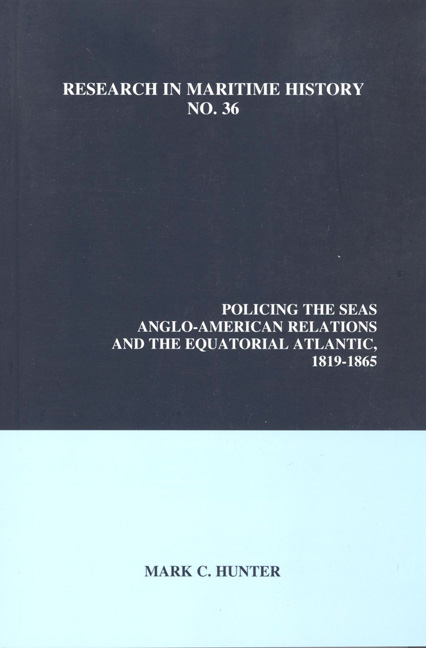Book contents
- Frontmatter
- Contents
- List of Tables
- List of Illustrations
- About the Author
- Acknowledgements
- Chapter 1 Introduction
- Chapter 2 The Atlantic
- Chapter 3 Anglo-American Policymaking, 1819-1834
- Chapter 4 Naval Relations and the Suppression of Piracy and Slaving, 1820-1830
- Chapter 5 A Naval Compromise, 1830-1842
- Chapter 6 The Royal Navy and West Africa, 1843-1857
- Chapter 7 The US Navy and West Africa, 1843-1857
- Chapter 8 Conflict Avoidance in the Equatorial Atlantic
- Chapter 9 The Civil War and Conflict Resolution in the Equatorial Atlantic
- Select Bibliography
Chapter 7 - The US Navy and West Africa, 1843-1857
- Frontmatter
- Contents
- List of Tables
- List of Illustrations
- About the Author
- Acknowledgements
- Chapter 1 Introduction
- Chapter 2 The Atlantic
- Chapter 3 Anglo-American Policymaking, 1819-1834
- Chapter 4 Naval Relations and the Suppression of Piracy and Slaving, 1820-1830
- Chapter 5 A Naval Compromise, 1830-1842
- Chapter 6 The Royal Navy and West Africa, 1843-1857
- Chapter 7 The US Navy and West Africa, 1843-1857
- Chapter 8 Conflict Avoidance in the Equatorial Atlantic
- Chapter 9 The Civil War and Conflict Resolution in the Equatorial Atlantic
- Select Bibliography
Summary
The deployment of the US West African squadron is significant because its duties reflected the government's goals. Its main duty was to protect and promote American commerce and prevent British interference with US-flagged ships. Slave-trade suppression was too contentious domestically for the US Navy (USN) to focus on it off West Africa. While the USN captured some slavers and sent them to the US, because of the squadron's small size, legal constraints and its primary goal, Americans failed to patrol the entire coast in search of slavers. Instead, the American attack on Berriby in 1843 epitomized the squadron's purpose. This conflict instilled in natives “respect” for Westerners and their traders to the pleasure of both British and American observers. American and British goals differed, but the presence of the two navies furthered their objectives. To these ends, the small US force periodically cruised along the coast, collected commercial intelligence, “showed the flag” and occasionally used force to show that it was serious.
Nevertheless, the home waters remained important, as during the Mexican War (1846-1848) when West African deployment was further curtailed, and those warships that remained also had to protect US shipping in the eastern Atlantic from potential attack by Mexican privateers. With commerce protection and promotion the primary objective, individual views on slavery rarely rose beyond occasional operational comments. Washington, unsympathetic to slave-trade suppression, wanted commerce protected, and naval officers were charged with the task. Only officers like Andrew Hull Foote, sympathetic to the cause of the American Colonization Society (ACS) and slave-trade suppression, exhibited any enthusiasm for the secondary objective.
With slave-trade suppression and commerce protection separate issues, the British were sceptical of American sincerity. In turn, the US feared British commercial advances, in particular the growth of steamship lines that provided regular communications between the African coast and London. US commodores, such as Isaac Mayo, believed that unless the government acted, American merchants would be driven from the African coast by their more efficient British counterparts who were aided by regular steam lines and protection by the Royal Navy (RN). Despite the Webster-Ashburton Treaty and some mutually beneficial effects of sea power, the separate objectives and strategies of the RN and USN generated tension between the countries.
- Type
- Chapter
- Information
- Policing the SeasAnglo-American Relations and the Equatorial Atlantic, 1819-1865, pp. 169 - 196Publisher: Liverpool University PressPrint publication year: 2008

